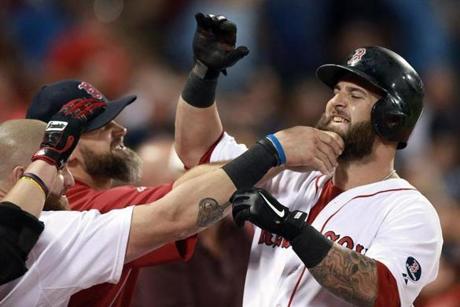Sports Saturday
So the Red Sox grew beards, played loose, and won the world championship. Were beards the secret of their success? Herman Melville, who incidentally was a Massachusetts native, would have thought so.
I’ll explain why in a moment. First, here’s Richard Brody of The New Yorker propounding his own theories of facial hair:
A beard is a celebration of nature that brings appearance closer to that of untamed human animals—a Rousseau-esque gesture that was crucial to the age of Aquarius, a time when long-established norms of behavior collapsed and made public life a clearer expression of formerly unspeakable private desires. By contrast, the shaven and crew-cut athlete suggests a martial fury that is joyless—a grim, self-denying efficiency that may work in war but is exactly the opposite of the essence of baseball, which, for all its competitive ardor, is playtime. (And the over-all increasing regimentation and militarization of modern life has no more powerful, intimate symbol than the fanatical prevalence of depilation.)
For an athlete, the beard suggests a return to nature as well, to a different sort of battle—to the feral ferocity of medieval or primitive men, or, at least, to the rugged outdoorsiness of nineteenth-century man in confrontation with the elements, both on and off the stubbly and rock-strewn sporting fields. Yet the religious or sacerdotal side of a beard is never far behind: it implies a monastic indifference to worldly cares, a hermetic withdrawal from ordinary concerns, and a fixed focus on the higher mysteries, whether divine, philosophical, or the split-finger fastball.
Last year the Red Sox had as their manager Bobby Valentine, a strict disciplinarian who favored a “grim, self-denying efficiency” and whose heavy handed ways helped land Boston in last place and their worst record in 47 years. He certainly would not have allowed behavior such as we saw this year. Valentine is like Captain Claret in Melville’s novel White Jacket, who nearly causes a mutiny on board his ship with his capricious order that his men all shave their beards. Here’s the crew’s reaction:
[W]hat barbarity, after all! What! not thirty days’ run from home, and lose our magnificent homeward-bounders! The homeward-bounders we had been cultivating so long! Lose them at one fell swoop? Were the vile barbers of the gun-deck to reap our long, nodding harvests, and expose our innocent chins to the chill air of the Yankee coast! And our viny locks! were they also to be shorn? Was a grand sheep-shearing, such as they annually have at Nantucket, to take place; and our ignoble barbers to carry off the fleece?
Captain Claret! in cutting our beards and our hair, you cut us the unkindest cut of all! Were we going into action, Captain Claret—going to fight the foe with our hearts of flame and our arms of steel, then would we gladly offer up our beards to the terrific God of War, and that we would account but a wise precaution against having them tweaked by the foe. Then, Captain Claret, you would but be imitating the example of Alexander, who had his Macedonians all shaven, that in the hour of battle their beards might not be handles to the Persians. But now, Captain Claret! when after our long, long cruise, we are returning to our homes, tenderly stroking the fine tassels on our chins; and thinking of father or mother, or sister or brother, or daughter or son; to cut off our beards now—the very beards that were frosted white off the pitch of Patagonia—this is too bitterly bad, Captain Claret! and, by Heaven, we will not submit. Train your guns inboard, let the marines fix their bayonets, let the officers draw their swords; we will not let our beards be reaped—the last insult inflicted upon a vanquished foe in the East!
Where are you, sheet-anchor-men! Captains of the tops! gunner’s mates! mariners, all! Muster round the capstan your venerable beards, and while you braid them together in token of brotherhood, cross hands and swear that we will enact over again the mutiny of the Nore, and sooner perish than yield up a hair!
Fortunately for the Red Sox, Valentine was fired and replaced by a manager who knew how to build team chemistry. When John Farrell saw that growing beards created a sense of camaraderie and encouraged playfulness, he supported it. He’s like Mad Jack, the lieutenant in White Jacket who figures out how to keep the beard rebellion from spiraling out of control:
Mad Jack had the trumpet; and no sooner was this incipient mutiny reported to him, than he jumped right down among the mob, and fearlessly mingling with them, exclaimed, “What do you mean, men? don’t be fools! This is no way to get what you want. Turn to, my lads, turn to! Boatswain’s mate, ship that ladder! So! up you tumble, now, my hearties! away you go!”
His gallant, off-handed, confident manner, recognising no attempt at mutiny, operated upon the sailors like magic.
They tumbled up, as commanded; and for the rest of that night contented themselves with privately fulminating their displeasure against the Captain, and publicly emblazoning every anchor-button on the coat of admired Mad Jack.
The sailors still have to shave off their beards—Mad Jack is not captain, after all—but White Jacket compliments the lieutenant’s leadership:
Therefore, Mad Jack! you did right, and no one else could have acquitted himself better. By your crafty simplicity, good-natured daring, and off-handed air (as if nothing was happening) you perhaps quelled a very serious affair in the bud, and prevented the disgrace to the American Navy of a tragical mutiny, growing out of whiskers, soap-suds, and razors.
And so should Boston laud John Farrell.
